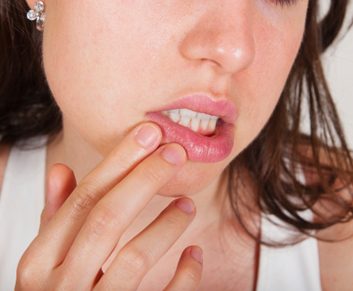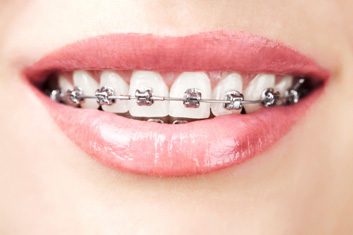
1. Canker sores
Dental hygienist Arlynn Brodie in Kelowna, B.C., says canker sores are what she sees most often. “They’re often triggered by things like stress and vitamin deficiency,” she notes. Other possible causes of these small mouth ulcers include fatigue, food reactions and, in women, premenstrual hormones.
Despite their often tiny size, canker sores can really hurt. But they’re not contagious and they usually heal in seven to 10 days. Anti-inflammatory drugs will help with the pain, and rinsing with a solution of two teaspoons of salt in an eight-ounce glass of warm water will soothe the tissues.
In the meantime, go gentle on the brushing. “You can try toothpaste for sensitive teeth, because it’s less irritating,” Brodie adds. See your dental health professional if a canker sore is very bothersome or doesn’t heal.

2. Bitten tongue or cheek
What’s the worse part about accidentally biting the inside of your mouth? After you’ve done it once, you’re more likely to chomp down on it again because it’s now swollen or out of alignment. Like canker sores, mouth bites will get better on their own, but anti-inflammatory medications and saltwater rinses can help to treat the symptoms. Topical anesthetic (numbing) products can also relieve the pain of these mouth sores.

3. Burned tongue
Have you ever paid the price for your eagerness to have that first gulp of morning coffee? A burned tongue or palate isn’t fun, and the effects can last up to a week. If you remember to apply ice right away, though, you can lessen the extent of the injury.
A burned mouth will also feel better with a topical anesthetic (don’t eat while your tongue is numb!), or even just sucking on frozen ice pops. And next time you reach for your hot coffee, remember to sip it slowly until the temperature’s a little less hazardous (or swap it for a coffee smoothie!).

4. Cold sores
A cold sore isn’t actually caused by a cold virus, but a herpes virus. “Cold sores are recurrent,” says Brodie. “Once you’ve had one, the virus rests in a dormant state until it’s triggered again. Then it will reappear.” Common triggers for these blisters include stress, fatigue, fever, menstrual cycle changes and sun exposure. Most of the time, cold sores form on the lip and last one to two weeks. Numbing ointments will help while you wait for them to heal.
The biggest difference between cold sores and other common mouth sores: They’re highly contagious. “They can easily be spread to others,” says Brodie. “Special care has to be taken when kissing or wiping your hands on your mouth.” And don’t pick at them!

5. Sores from braces or dentures
Orthodontic work and dentures can scrape and cut mouth tissues, and be literally a pain. Like other mouth sores, these will heal with time and can be helped with saltwater rinses. But it’s important to know what’s causing the irritation so it can be prevented from happening again.
If the cut’s coming from your braces, try applying orthodontic or dental wax over the sharp area. If you wear dentures, you may be getting irritation from a piece of trapped food. Check and clean your dentures thoroughly.
In many cases, a mouth sore is caused by dentures that don’t fit properly and are rubbing as a result. Then the dentures should be adjusted. “Often, when people lose weight, their dentures no longer fit well,” Brodie says, adding: “Dentures should be monitored regularly for changes so you don’t get mouth sores.”

When it’s something more
Occasionally, a mouth sore is cancerous. Everyone should watch for signs of oral cancer, but it develops more often in people who are over 45, smoke or chew tobacco, drink heavily, or have a long history of sun exposure.
Any sore that doesn’t heal in two weeks, especially a white or dark-red patch on the gum or tongue, should be checked by a dental or health professional. Other signs to look for are lumps and thickening, difficulty swallowing, and bleeding.
The good news? Oral cancer can be cured when it’s caught early, so it’s important to follow up on any suspicious mouth sores. Odds are it’s something other than cancer. But if it’s not, you’ll be glad you got it checked out.
Related:
• Why is my mouth always dry?
• 9 tips for preventing oral cancer
• 5 dental symptoms you should never ignore
